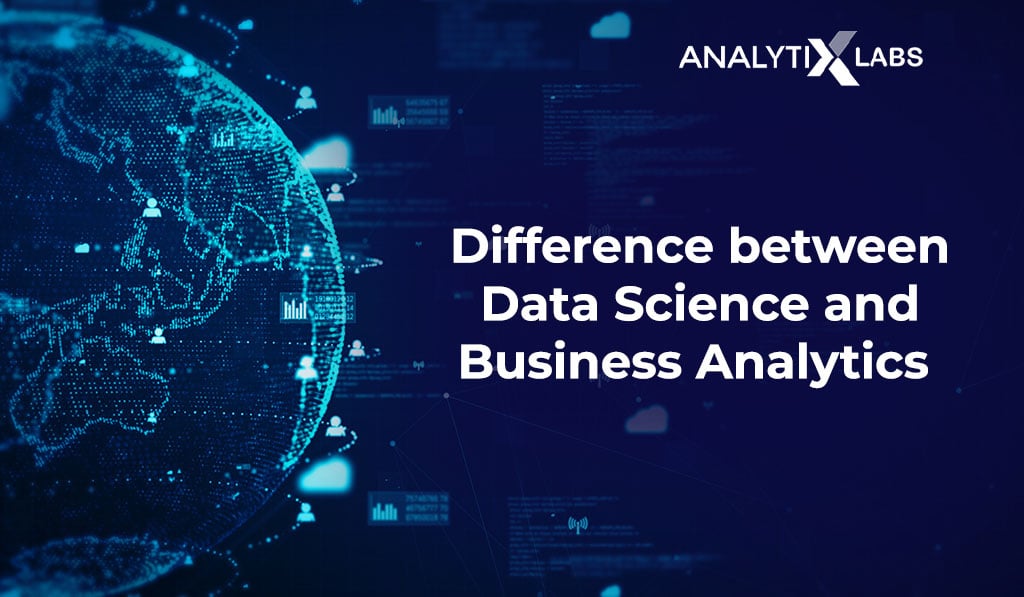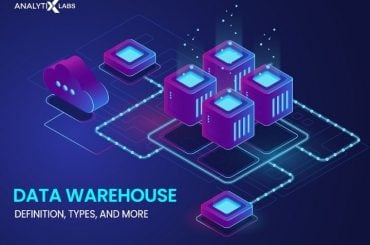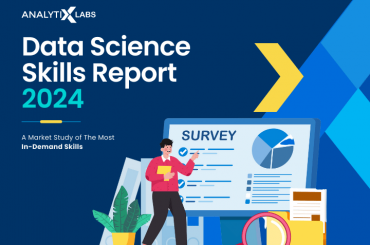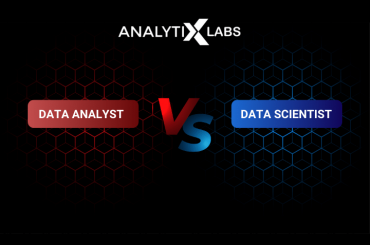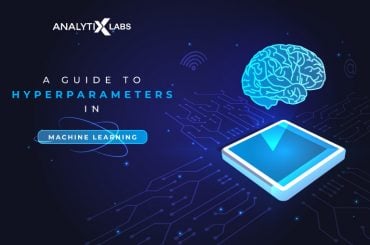Data Science and Business Analytics have a lot in common and generally go hand-in-hand for most business processes. However, business analytics finds little use when it comes to IT or robotics. Data Science is absolutely essential for any function that requires advanced data-driven solutions, and this is where we can slowly see the differences between the two fields.
On the other hand, business analytics is only limited to business operations and is a more specialized field that caters primarily to decision-making and optimizing business processes. There is no end to the benefits of Data Science, from allowing companies to increase sales through data-driven marketing or advertisements and even building Artificial Intelligence (AI) systems that learn by communicating with humans and then accurately emulate human responses. The possibilities are endless.
Business Analytics is responsible for providing companies that employ Business Analytics techniques and tools with a substantial edge over the competition. Having a competitive advantage in the market is crucial in modern times, especially with the vast number of options clients or consumers get in terms of products and services.
Without utilizing business data efficiently and without Business Analytics, businesses are bound to lag behind, especially when the competition uses an arsenal of advanced analytical tools such as R, Python, Tableau, or Microsoft Power BI. Still, Business Analytics helps companies cut costs, decrease waste, increase production capacity, improve operations, and customer satisfaction, and increase total revenue. Let us learn about the two fields in-depth and understand their differences.
What is Data Science?
Data Science is a vast field or domain that involves generating, maintaining, and effectively using data for various technical and business purposes. Whether IT companies or non-IT companies, large corporations or middle-level corporations, everyone generates and uses data in various forms. Data Science allows these companies to efficiently use structured and unstructured data in order to gain insights, make forecasts and effectively optimize their performance.
For example, Data can be used to create a production or manufacturing facility that is more energy-efficient while distributing tasks among skilled labor more strategically. This will allow the company to save costs while increasing its production capacity. Data Science is also used for making predictive models that help businesses counter market mishaps, hedge risk, and sometimes even take advantage of anomalies or abnormal market activities.
Types of Data Science
Foundationally, Data Science involves working with data that has various attributes. Professionals from this field are tasked with extracting data, cleaning data, then using it for machine models, and AI solutions as per the requirements. Historically, Data Science has been using scientific methods, tools, and algorithms but recently has been fast adopting the use of AI, Predictive Modelling, and Machine Learning. Without Data Science, intelligent automation is impossible.
Related fields such as Data Analytics, Data Engineering, and roles such as Data Architects are also essential. This is especially true due to the importance of building, sustaining, monitoring, and utilizing databases or data for daily business operations, robotics, IoT applications, research and development.
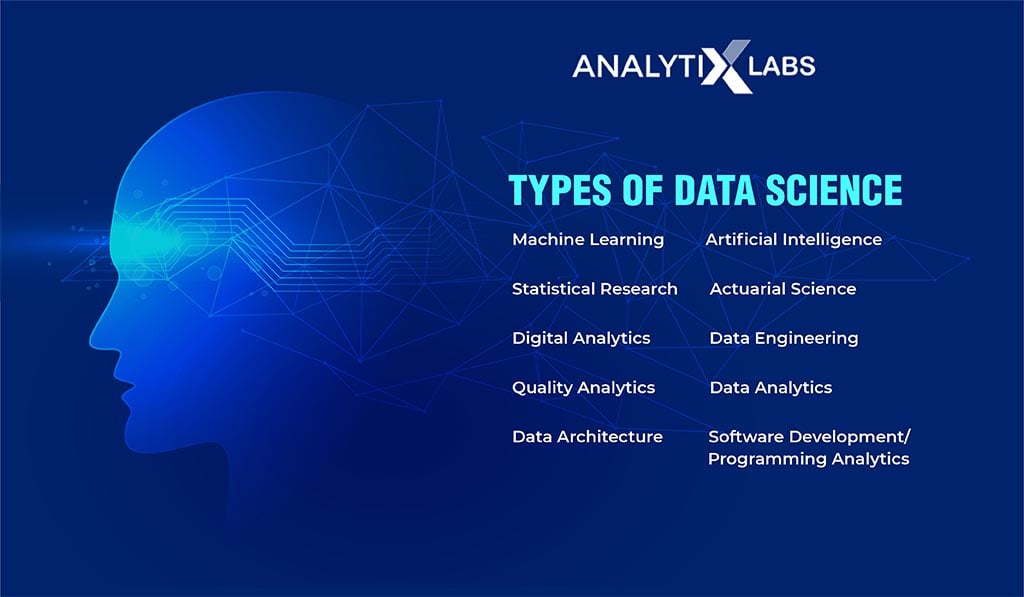
Data science has several sub-fields or types, as below:
- Machine Learning
This is an associated domain of Data Science and an individual field of its own. Data Science in Machine Learning (ML) is absolutely necessary. This is due to the immense need to source data that can be used through cleaning or removal of noise. Without good training datasets, machines or systems can never learn effectively and are bound to make mistakes. Similarly, Machine Learning is also used extensively to support other Data Science projects as well such as predictive modeling.
-
Artificial Intelligence
AI is a booming field and the path to training AI or AI-driven applications goes through Data Science. These can be actual robots or virtual bots that feed on massive packs of data and learn how to respond or take action accordingly. This is not the same as ML as AI removes the need for supervision and begins to emulate humans. Like ML, AI is dependent on data warehousing, data generation, and data sourcing.
-
Statistical Research
This is an important area that more Data Scientists are increasingly getting involved with. Statistical Research requires working with a lot of data and sorting them out in order to effectively use data values for plotting or researching.
-
Actuarial Science
The field of finance and risk management has always been data-driven and with the introduction of Big Data concepts, they have incorporated Actuarial Science with Data Science.
-
Data Engineering
Data engineering is focused on making data pipelines and making data more usable or accessible at an enterprise level. This can be making data easier to access and transform. Or, it can be making data easier to analyze by sourcing and analyzing the systems that will be using the data as well as sample data.
-
Data Architecture
This is an essential component of any IT organization or corporation that generates, collects, or uses data. Data Architects ensure that data systems and data storing maintain standards and protocols. Data Architecture is in-charge of data systems, data sourcing data models, and data integrations. This field ensures that the company’s requirements are met when it comes to data and the arrangement of IT architecture that will be using this data.
-
Software Development/Programming Analytics
This is similar to Quality Analytics but requires more advanced programming and sometimes even involves building your custom languages or systems. Data Science is extensively used for supporting development and programming projects through automation, analytics, and predictive systems.
3. What is Business Analytics?
Business Analytics can be defined as a specialized field that is associated with developing and using tools, software, statistical methods, and data to help businesses make data-driven decisions. Using historical or real-time data allows companies to take robust and effective action. Business Analytics makes making data-backed decisions possible with the help of sourcing and analyzing data. Unsorted or unstructured Data is filtered, cleaned, and sorted in order to gain insights that are cognizable or easily understood by non-technical members.
Companies also develop their own analytics tools or technologies to facilitate more personalized analytics or for custom business requirements. Professionals in this sector are tasked with using Business Intelligence software or even office suites such as Microsoft Exel to maintain, analyze, project, and then present data to stakeholders, seniors, or the operations team.
Read more on What is Business Analytics.
Types of Business Analytics
Business analytics is heavily involved with business operations and optimizing business activities. Performance Management and Quality Analytics are also a considerable part of Business Analytics and other fields such as Financial Analytics, Risk Analytics, and Market Analytics.
Business analytics has also made surveying consumers and substitute products more accessible and faster. Businesses are now armed with the ability to understand customer behavior and consumer demands. Thus, with Business Analytics, companies are now more prepared to serve their consumers better. The days of manually noting down numbers and contemplating annual performances are over, with the availability of BI tools and other analytical systems for small businesses and merchants as well. Like data science, business analytics also has various sub-fields or types to explore.
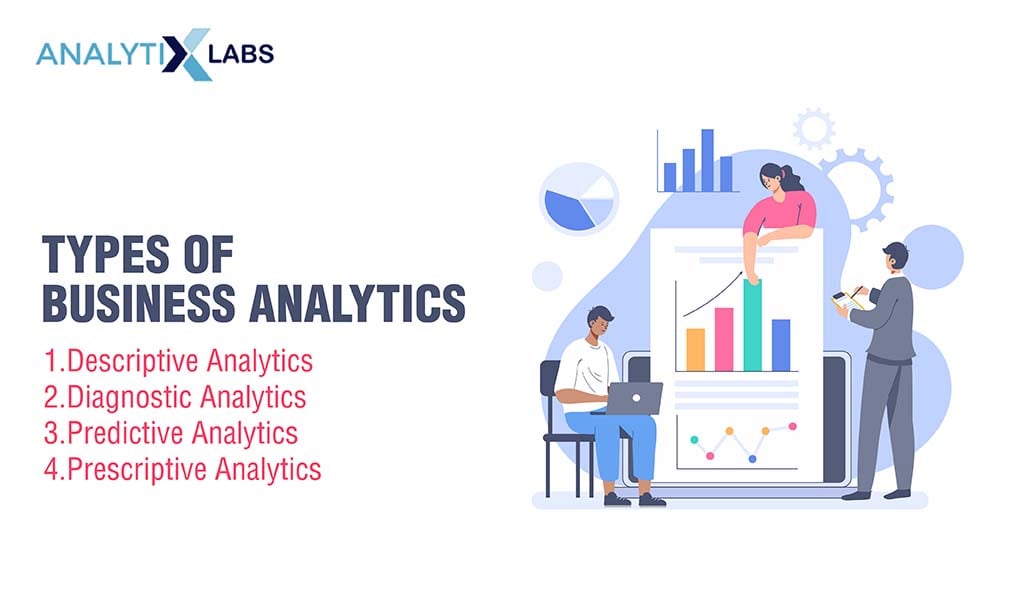
These are the various types of Business Analytics :
-
Descriptive Analytics
This is the field of Business Analytics that deals with using existing or historical data in order to gain insights. This can be real-time data or old data that is analyzed after data aggregation and data mining. This is absolutely essential for creating powerful marketing, investment, or sales plans.
-
Diagnostic Analytics
This kind of business analytics focuses on trends, patterns, and ongoing events. In this field, data discovery and data mining are extensively used to use probabilistic theories to understand what factors affect events. Classification and regression are used alongside training algorithms for this kind of analytics.
-
Predictive Analytics
Predictive Analytics deals with forecasting and predicting events. With the help of Machine Learning and various statistical models, the likelihood of events occurring is predicted. For example, consumer behavior and market fluctuations. Predictive Analytics works hand-in-hand with Descriptive Analytics in order to provide extremely accurate results that cannot be achieved by Business Intelligence alone.
-
Prescriptive Analytics
This kind of Business Analytics goes beyond predictive analytics and recommends data-driven decisions to businesses. This type of analytics analyses the goal and figures out the best possible way to achieve that goal through learning the relationship between actions and results. Feedback analytics and iterative analysis are absolutely essential for this kind of Business Analytics.
-
Digital Analytics
This can be considered to be Data Science and Business Analytics both. As many businesses use digital data from the digital space or websites in order to make data-driven decisions. However, handling, sourcing, storing, and maintaining the data is associated with Data Science.
-
Quality Analytics
This is another area of Data Science that is also heavily related to Business Analytics. Quality Analytics is essential for analyzing production lines or products and making production more efficient or making products better. Anything can be perfected through rigorous Quality Analytics to reduce waste, and errors and increase the quality of products or processes. Data Science is absolutely crucial for this – the data must be analyzed and handled by experts in order to identify the problems or shortcomings.
-
Data Analytics
Data Analytics is a very important part of Data Science and this field is associated with preparing data for analytics, analyzing data, and then gaining cognizable insights. Data Analytics and Big Data Analytics are also highly involved with Business Analytics as well.
To know about the types in detail, read our blog on Types of Business Analytics.
Difference between Data Science and Business Analytics
When talking about Data Science and Business Analytics differences, we must first understand the primary goal of these fields. In the case of Data Science, the primary goal is to work with data and ensure that the data can be used efficiently for various purposes. In Business Analytics, however, the primary goal is not the Data itself but extracting insights from data or using data to make data-driven action.
Business Analytics is focused on using business data in order to increase performance, sales, or revenue. At the same time, data science involves sourcing the data, cleaning the data, and making the data usable. Data Science and Business Analytics both work with mining data, but the way each field uses the Data is different.
Business analytics is a specialized field that uses Data for optimizing business operations and making better business decisions. In contrast, Data Science can use data to support IT processes, sustain IT infrastructure, or build robotics. The scope for Data Science is endless, and it is a massive field consisting of many sub-domains and jobs, while business analytics is only focused on business activities. Data Science and Business Analytics courses can help you learn more about these individual fields and about how vastly different Data Science and Business Analytics jobs are.
Here are some more differences:
- Data Science requires programming and more core knowledge of computing while Business Analytics can be carried out without these.
- Business analytics exists to solve business problems while Data Science helps with any operation or process that deals with data.
- Data Science deals with more complex data such as unstructured data and data stored in clusters while Business Analytics generally uses data from data warehouses and utilizes structured or static data.
Now that you know how these two are similar but different from each other, let us take a closer look at how you can create a lucrative career in both, and what roles and responsibilities you will need to fulfill.
Data Scientist Job Role
Your role as a data scientist will revolve around managing and maintaining huge data sets as effectively as possible. Hence, your job description may include a few or all of the below job roles.
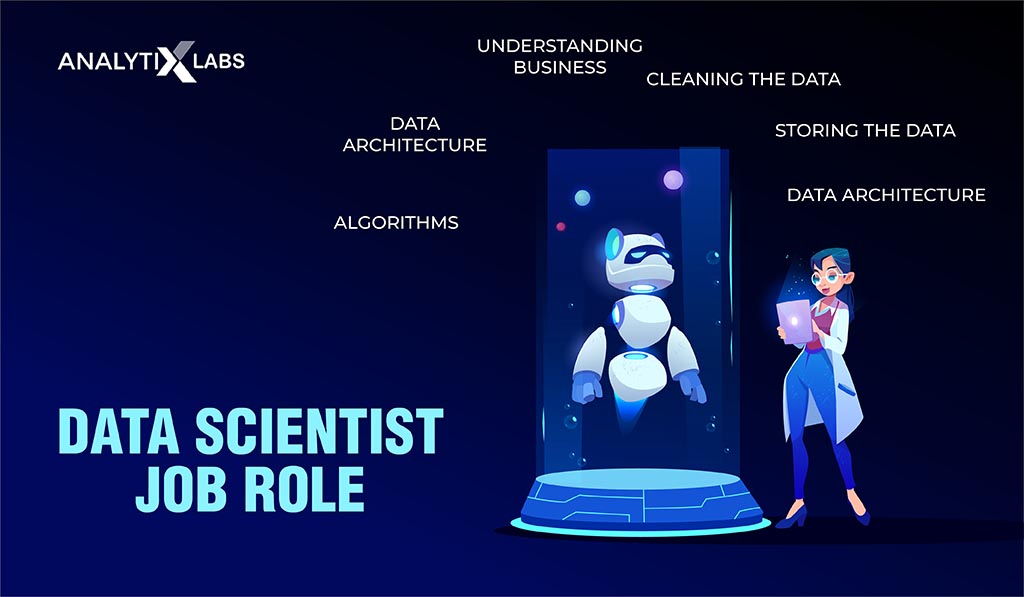
Here are the job roles of an average Data Scientist:
- Understanding business requirements and the required data.
- Acquiring or sourcing the data. If the data is not available, then Data Scientists are in charge of generating the data.
- Processing and cleaning the data.
- Transforming the data.
- Integrating the data and storing the data.
- Data exploration and Data investigation.
- Creating data models and algorithms.
- Data analysis.
- Applying Data Science techniques such as statistical modeling or Machine Learning.
- Measuring results and gaining insights.
- Solving data problems.
- Data architecture.
- Designing of data systems and data engineering.
- Maintaining datasets and databases for concurrent use.
You can also enroll in our online learning module for data science and our exclusive PG in data science certification courses course at your convenience, or you can book a demo with us. You can also enroll in our course in business analytics and learn all the fundamentals and advanced aspects of BA at your convenience, or you can book a demo with us. Q1. Are Data Science and Business Analytics the same thing? No, there are many subtle Data Science and Business Analytics differences that we come to know of once you are involved with jobs in any of these fields or when you take up Data Science and Business Analytics courses in India. From far, there might be many similarities between the two domains, however, these two are vastly different when it comes to the way these industries operate and their goals. Q2. Which is better, Data science or Business analytics? Data Science is a massive field that comprises many important sub-domains. Data Scientists have more control over the kind of projects they can be involved with or the fields they can be a part of. On the other hand, Business Analytics deals with business operations and is limited to activities that are deemed necessary within a running business. However, Data Science is only essential for companies heavily invested in IT, while most corporations need business analytics. Q3. Can Data Scientists become Business Analysts? Yes, Data Scientists can become Business Analysts, and the vice-versa is also true. Data Science and Business Analytics jobs have a lot in common. Individuals from any of the two fields can easily migrate to the other by learning an additional skill or two. Both service-based and product-based companies or businesses around the world have already started adopting Data Science to cater to their users and clients better by personalizing experiences and making daily tasks easier to do. For example, let us take the example of large music platforms such as Apple Music or Spotify. These platforms are driven by a learning pattern that allows them to analyze the kind of music the user is listening to and then recommend other songs that the user will like. Data Science also has a considerable part to play in Data Analytics and is absolutely necessary to use Big Data effectively. Meanwhile, Business Analytics is crucial to optimize business performance and gain a competitive edge. In order to truly learn more, it is recommended that you enroll in one of the reputed Data Science and Business Analytics courses in India. AnalytixLabs offers many holistic courses in Data Science and Business Analytics. The institute is one of India’s leading Business Analytics, AI, and Data Science training institutes that caters to these specialized fields.Here are the job roles of an average Business Analyst:
Skills required for Data Scientist
Here are the skills that are necessary for Data Scientists:
Skills required for Business Analyst
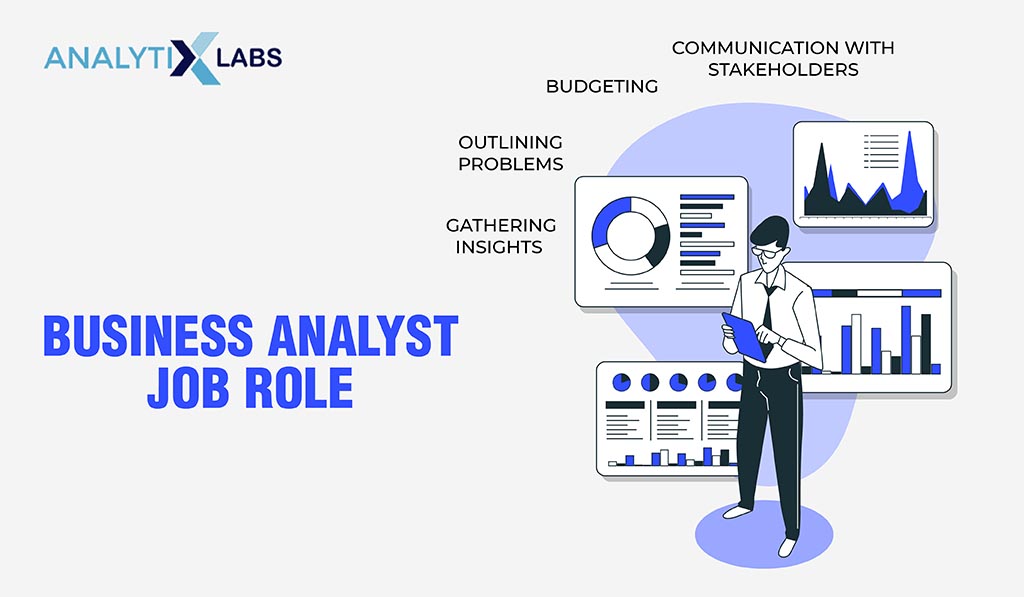
Here are the skills that are necessary for Business Analysts:
FAQs: Frequently Asked Questions
Conclusion

